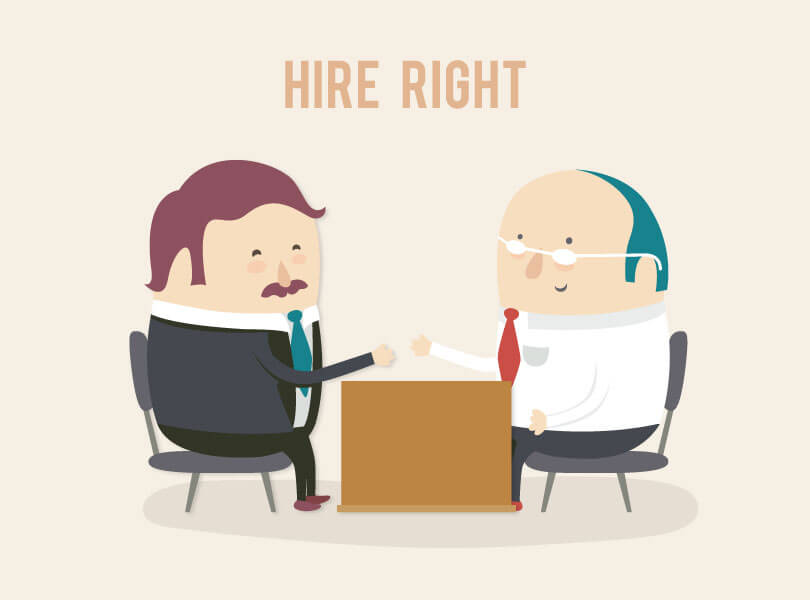 Poor hiring can cost a company a lot in the long run. This is why employers always look for definite skills while hiring candidates apart from their academic track record. Besides domain aptitude and experience, employers most often regard secondary parameters as a more significant determining factor over academic proficiency while evaluating an applicant. With our ever changing work environment and an even faster evolving world environment, we find that what you know is not as important as what you are willing to pick up along the way, and how quickly you are able to adapt. Not surprisingly, employers are becoming choosier in cherry picking the right candidature for a profile. As per the report submitted by The Economic Policy Institute recently, approximately 8.5 percent of the college graduates are unemployed between the age group of 21 and 25.
Poor hiring can cost a company a lot in the long run. This is why employers always look for definite skills while hiring candidates apart from their academic track record. Besides domain aptitude and experience, employers most often regard secondary parameters as a more significant determining factor over academic proficiency while evaluating an applicant. With our ever changing work environment and an even faster evolving world environment, we find that what you know is not as important as what you are willing to pick up along the way, and how quickly you are able to adapt. Not surprisingly, employers are becoming choosier in cherry picking the right candidature for a profile. As per the report submitted by The Economic Policy Institute recently, approximately 8.5 percent of the college graduates are unemployed between the age group of 21 and 25.
The good old focus on a good educational background still helps you pass an initial screening for the interview. Of course an employer’s expectation from new hires varies depending on the business, availability of the niche skill, company size and economic division of the region. The selection process also differs with demand, contingency of a position and domain.
Then how exactly does an employer distinguish between applicants in a room full of interviewees. Most often it boils down to the attitude of the candidate. Again, while new hires from most metros work on developing the right mannerisms, a large chunk of the workforce, especially the fresh pass-outs from the suburbs (who are as much meritorious and oftentimes more) are ill informed or ignorant about the basic conduct expected of them. And as capable as they might be, most employers deter recruiting candidates who do not appear to be ready. To elaborate further, a candidate’s willingness to join a company should reflect in his attitude, the homework he has supposedly done regarding the company, his confidence, his honesty, and his professional manners. Appearing late for interview, inappropriately dressed, with unshaven beard and unkempt hair or appearing for the interview with inappropriate makeup, could put off a potential employer right at the start. In short, inconsequential misconduct during an interview can be an obvious negative point. Here are a few traits that I find offending in an interviewee, and would not want in my new hire:
- Impunctuality: When conducting interviews, I do not like being waited for an interview. Arriving late for your interview at iAdroit is not appreciated, and appearing too early for the interview is equally offending. The interviewer has to keep aside his/her impending work to accommodate the interview, and this gesture certainly doesn’t go down well with most employers. Ideally, you should appear 15 minutes before the scheduled time.
- Arriving Unprepared: I have been told on one occasion by my interviewee that he was not carrying any documents that he was supposed to, since he was informed about it at a short notice! Needless to say, he wasn’t hired!
Reaching an interview session unprepared is a poor show. Arriving without a resume, or with insufficient time to complete the interview process or not being able to attend the practical/machine tests because of under preparation are just some instances when hiring managers will want to refuse employment to eligible candidates. Being unaware about the company’s main goals, services and how you can align your services for the greater mission of the organization are just ways that go on to show that you are not serious enough about the opportunity. A basic research of the company is expected from an interviewee.
- Poor Sense of Dressing: The way you dress up matters. Normally we get seconds to create a first impression. And as they say ’first impression is the last impression’. In a formal interview, the way you represent yourself is crucial, so pay attention to detail. Even with the most modern work culture in most offices today, I prefer my interviewees in formals on their interviews.
Avoid sending wrong signals with 1) improper dressing, 2) unprofessional get up, 3) strong perfume and bad breadth, and 4) improper shoes. These can easily result in elimination from a job interview. Poor dressing signifies that you couldn’t care less for the company or the opening. Collared shirts, formal trousers, business suits, western or ethnic formal wear for women are ideal for interview in any office environment. Additionally, take care to have proper hair, makeup, and accessories. Cleanliness is a top priority and the least you can do. You are free to switch to the office dress code any day once you join. If you are still confused about the dress code, find out from available sources or ask your interviewer.
- Dishonesty: An article published in Global Post in 2011 signifies that 46% of the background checks don’t correspond to the information provided by an interviewee. That’s alarming!
A dishonest interviewee is eventually caught, as most employers conduct background checks to verify a candidate’s claims. Dishonest responses or deception should be avoided, because that may unnecessarily put you in poor light, or worse, into trouble. A professional relation should start on a clean note.
- Unkind words for previous employer: Criticizing your ex-employer in an interview session is an offending act. This exposes your immaturity, and makes you culpable of repeating this behavior with your present employer – you could be using similar unpleasant adjectives about this employer when you join the next organization in the future. Belittling your previous company or their policies doesn’t represent you as a team player. Hiring managers prefer candidates who can appreciate difference of opinion. A potential employer looks for employees that have the competency to work well with people of different temperaments and can maturely handle conflicting situations in a workplace. This behavior conveys an image that you are difficult person to please and to deal with. Be pleasant and show your appreciation for your employer.
- A Know-All. One thing most employers displease is a candidate with an attitude that he knows everything there is to know. Answer questions, elaborate when necessary, and pause to allow your interviewer to speak. Admit your ignorance when you need to, and your honesty will be appreciated. Ask questions (reasonably) to the interviewer. Your questions portray your willingness, drive and commitment to your position. In an interview, your attitude gets under the lens, you are judged for what you are and what you aren’t, so be careful of your conduct. Put your best foot forward with that right attitude. Remember- 1) to talk about past work experiences with reasonable pleasantness, 2) give due credit to the involvement of others in your success, 3) avoid being defensive, 4) don’t be a yes-man, and 5) don’t try to be pally with your interviewer. An over-friendly address or behavior gives out a signal to your employer that you lack respect for your manager, your job and the company. Hence even if you are the best, hold back!
- People skills: Hiring managers always look for professional people in the organization. Most organizations work on a customer facing environment, wither physically or virtually, and you are expected to be street-smart, polite, firm and basically courteous (without being meek). Underconfident candidates with poor people skills are easily stuck out from the list, while enthusiastic applicants are a recruiter’s first choice.
- Finally, I don’t like candidates engaging in unprofessional acts like 1) posing inconsequential questions, 2) inadequate knowledge of the company, 3) nagging about compensation, increments and benefits, and 4) thin interest in the position.
So the next time you appear for an interview for iAdroit, remember that it’s your one time opportunity to create a lasting impression and securing a job. Abide by convention and interview etiquettes. While you could be the perfect choice in terms of your knowledge and experience, your attitude and willingness to work for the company makes all the difference. We will find out if you are equally passionate about working with us!


 (11 votes, average: 4.64 out of 5)
(11 votes, average: 4.64 out of 5)





